Britain’s Novichok Poisoning Incidents: Opportunities to Revive Glasnost?
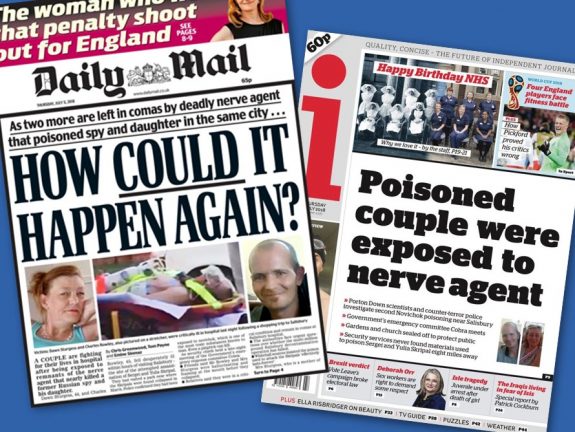
By Denis Bright
In the absence of new leads in the bizarre poisoning cases involving the Novichok nerve agent in Britain, the intensity of reporting in the mainstream media is certainly worth encouraging. While coverage of the Novichok poisonings sells papers and on-air time in Britain, its infotainment value also helps to chip away at some long-term blind-spots in coverage of legitimate national security issues.
Opportunities to Revive Glasnost?
Mainstream media coverage of the misuse of the Novichok nerve agent has focused on the shock of the new and unexpected angles on the Novichok poisonings.
The hospitalization of Sergei Skripal and his daughter Yulia captured international attention on 4 March 2018. Weeks later, Dawn Sturgess died from exposure to Novichok. Partner Charlie Rowley has since been released from the Salisbury District Hospital.
It is a long-shot to attribute the poisonings near Salisbury to unknown Russian agents as claimed by the British government. Just a week after the first Novichok poisoning in Salisbury Prime Minister Theresa May had already rushed to judgement in the preparation of her address to the House of Commons:
It is now clear that Mr Skripal and his daughter were poisoned with a military-grade nerve agent of a type developed by Russia.
This is part of a group of nerve agents known as ‘Novichok’.
Based on the positive identification of this chemical agent by world-leading experts at the Defence Science and Technology Laboratory at Porton Down; our knowledge that Russia has previously produced this agent and would still be capable of doing so; Russia’s record of conducting state-sponsored assassinations; and our assessment that Russia views some defectors as legitimate targets for assassinations; the Government has concluded that it is highly likely that Russia was responsible for the act against Sergei and Yulia Skripal.
As a strategic stalwart within the US Global Military Alliance, Britain will always want to protect its intelligence assets at home and abroad. However, the current diplomatic disputes between Britain and Russia are occurring at a time when there are inconsistencies in US Policies towards Russia. Australia too has joined in the domino effect of diplomatic expulsions from Russian embassies worldwide. Two Russian diplomats have been asked to leave Canberra in the wake of the first Novichok poisoning incident in Britain.
Britain’s over-reaction to the poisoning of Sergei and Yulia Skripal aligns the government of Theresa May with the most hawkish opinion in Washington.
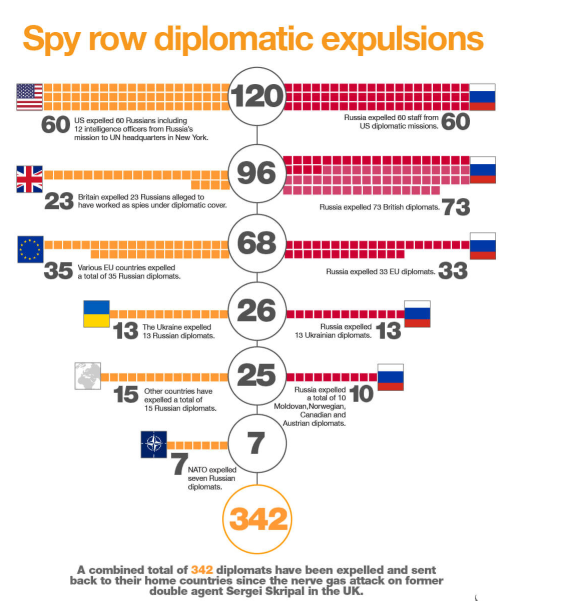
Image from Al Jazeera, 31 March 2018
A higher profile investigative role for the Organisation for the Prohibition of Chemical Weapons (OPCW) in the Netherlands was not encouraged after the first Novichok incident. However, the OPCW issued the following statement relating to the second poising incident in Amesbury near Salisbury on 30 June 2018:
THE HAGUE, Netherlands— 18 July 2018 —The Organisation for the Prohibition of Chemical Weapons (OPCW) received a request on 13 July from the United Kingdom of Great Britain and Northern Ireland (UK) for the OPCW to provide technical assistance regarding the incident in Amesbury.
In response to the request, the OPCW deployed a technical assistance team to independently determine the nature of the substance that is alleged to have resulted in the death of one person and left another person seriously ill. The OPCW team collected samples.
The samples will be sent to two OPCW designated laboratories and once the results of the analysis are received, the report will be submitted to the United Kingdom. The team completed its initial work and returned today, 18 July, from the UK.
Radio National (9 August 2018) noted that the British Government is requesting the extradition of two Russian nationals who are suspected of involvement in the first Novichok incident. The OPCW is also involved in the investigation of the second incident site at Amesbury. The prospects that Russia would volunteer the release of two of its subjects who were tracked leaving the UK is very remote.
The Times of Israel (23 April 2018) aired a less conventional interpretation of events in Salisbury weeks prior to the second Novichok incident:
Moscow has argued that the US, Britain and other Western countries acquired the expertise to make the nerve agent after the Soviet collapse. The Organization for the Prohibition of Chemical Weapons, an international watchdog group that analyzed the samples in the Skripals’ poisoning, confirmed British conclusions about the identity of the toxic chemical but not its origin.
Uglev and Leonid Rink, another top scientist in the Soviet chemical weapons program interviewed by the AP, gave conflicting theories about the attack.
While Uglev said the nerve agent could have come from Russia, Rink echoed the Kremlin line, alleging British intelligence might have used a less-lethal substance and then faked the evidence to implicate Russia. Britain has denied that. Both scientists agreed, however, that it probably will never be possible to determine the nerve agent’s source …
… When Mikhail Gorbachev came to power in 1985, his political reforms and closer ties with the West led to cuts in many military programs and an array of arms control agreements. In a show of openness, authorities even organized a trip to Shikhany for Western diplomats and journalists.
Novichok-class agents were only made in lab quantities and never entered mass production, Uglev and Rink said. Uglev estimated about 100 kilograms (220 pounds) were made for research and military tests.
“It’s hard to imagine that any significant amounts could have been left anywhere, except in researchers’ personal safes, where it was allowed to keep no more than 20 grams” — less than an ounce, he said.
The British Government’s failure to give its own credible interpretation of the poisoning episodes draws attention to the contemporary roles for the Port Down Defence Science and Technology Laboratory (Dstl). It has been operating since 1916 near one of England’s tourism draw-cards at Stonehenge. Dstl is just 18-27 kms away, depending on the route chosen. It is 14 kms from Porton Down to Salisbury.
The precincts of the Dstl have a sinister history of experiments with poisonous gas and other lethal agents on both animal and human subjects in the wider interests of the defence of the British realm. Expansion of Dstl has continued long after Britain signed up to the Chemical Weapons Convention (CWC) in 1997. This interpretative article from Andrew Griffin in The Independent is worth reading as it covers the new defensive functions of the facility.

To their credit, Rob Evans and Sandra Laville of The Guardian assisted in the quest for justice airman Ronald Maddison. He died at Pdtl in 1953 at the age of 20 years:
The family of an airman who died in government nerve gas experiments more than 50 years ago is demanding an apology from the Ministry of Defence after an inquest ruled he had been unlawfully killed.
After one of the longest lasting cover ups of the cold war, relatives of Ronald Maddison, were yesterday given the justice they sought. They are now calling for compensation from the MoD, as are up to 550 ex-servicemen who claim they too were duped into submitting to the tests. The multiple claims could run into the millions of pounds.
Maddison, from Consett, Co Durham, was aged 20 when he collapsed and died in 1953 after liquid nerve gas was deliberately dripped on to his arm by scientists at the chemical warfare establishment at Porton Down, Wiltshire.
After a hearing which lasted 64 days the inquest jury ruled yesterday he had been unlawfully killed by the “application of a nerve agent in a non-therapeutic experiment”. The unanimous verdict, which came after years of pressure by campaigners, was greeted with cheers and tears of joy by veterans who had also been subjected to similar chemical warfare experiments.
It is worth researching a series of articles from The Guardian on the most sinister aspects of the Pdtl:
From 1945 to 1989, Porton exposed more than 3,400 human “guinea pigs” to nerve gas. It seems probable that Porton has tested more human subjects with nerve gas, for the longest period of time, than any other scientific establishment in the world. Two other nations have admitted testing nerve gas on humans: the American military exposed about 1,100 soldiers between 1945 and 1975, and Canada tested a small number before 1968. Other countries, including France, the old Soviet Union and Iraq, are also likely to have exposed humans to nerve gas, but very little is known about their tests.
The group of chemicals known as nerve gases were first developed as weapons by the Nazis before and during the second world war. German scientists discovered the potency of these organophosphorous compounds which, in tiny quantities, disrupt a key element of the nervous system.
An under-reported event are the new identities being offered to Sergei and Yulia Skripal in the USA away from the prying eyes of Russian GRU military agents:
Britain’s Sunday Times newspaper is reporting that the country is considering offering Russian former spy Sergei Skripal and his daughter new identities and a new life in the United States to protect them from further attempts on their life.
Citing unnamed sources, the report published on April 8 said officials of Britain’s Secret Intelligence Service, or MI6, have discussed the plan with their counterparts of the CIA.
The close connections between the Skripal Family and Soviet GRU military intelligence networks extended across three generations prior to the fall of the Berlin (BBC News, March 2018).
Sergei Skripal played inconsistent roles during his period in pseudo-retirement in Salisbury. On one hand he was involved in co-operation with Britain’s M16 and security firm Orbis Intelligence from his pseudo-retirement in Salisbury (Daily Mail Online 10 March 2018). However, there are suggestions that Sergei Skripal wanted continued associations with family members in Russia. Britain indeed refused to grant a visa to Yulia Skripal’s cousin Viktoria from Russia during her period of hospitalization after the poisoning incident and a video was released of her appeal to Theresa May (The Mirror, 8 April 2018).
A Synopsis of Historical Intrigues Between Britain and Russia
Today’s frosty relations between Britain and Russia only make sense in the context of a long history of diplomatic intrigues between the UK and Russia which predates the Bolshevik Revolution of 1917. At other times, Britain made opportunistic overtures to Russia that ended the League of the Three Emperors of 1873 which could have resulted in a continental military bloc that was hostile to Britain after the Franco-Prussian War.
The last Russian Czarina Alix of Hesse held the title of Empress Consort of All the Russians during the reign of Czar Nicholas II (1894-1917). The Empress was the grand-daughter of Queen Victoria and this dynastic marriage had assisted in bringing Russia back from the cold on the battlefields of Europe during the Great War (1914-18).
Britain was involved in the Crimean War (1853-56) and joined France in supporting the Ottoman Empire against Russian strategic expansion in the Black Sea Region. Britain also provocatively supported Japan during the Russo-Japanese War of 1904-05.
Opposition to Russia returned with a vengeance after the Bolshevik Russia of 1917. Britain and other allied countries like Japan and the USA supported the White Armies in futile attempts to topple the Bolshevik Regime.
Australian volunteers had joined the fourteen battalions of Commonwealth troops in the North Russian Expedition of the Archangel Campaign (1918-20).
Britain did not establish initially diplomatic relations with Bolshevik Russia. Change came with the election of the Minority Labour Government of Ramsey MacDonald in December 1923. Just prior to an opportunistic early election in 1924 to seek an absolute parliamentary majority for Britain’s first Labour government, British Intelligence released the forged Zinoviev Letter with the assistance of sensational reporting in the Daily Mail.
The Zinoviev Letter falsely claimed that a future MacDonald Labour Government would deepen relations with the Soviet Government to promote the cause of Leninism in Britain and its Empire. Labour was back in the political wilderness with a loss of forty seats and did not secure its absolute parliamentary majority until 1945.
After pragmatic co-operation with Stalin during the Second World War, relations with Soviet Russia deteriorated during the Cold War. The fall of the Berlin Wall should have ended Cold War intrigues with the new Russian Confederation. NATO persisted in the extension of its influence in Eastern Europe, the Ukraine and Central Asia.
By 2007, Russia resumed its long-range air patrols in the North Sea and RAF jets were sometimes scrambled to acknowledge their presence.
Russian defector Alexander Litvineko (1962-2006) was poisoned with lethal plutonium in Britain and the assassination was attributed to the Federal Security Service (FSB) by an official British Inquiry in 2016.
NATO’s strategic expansion in the Balkans and Black Sea Region is still a work in progress:
TIRANA, Albania — The prime minister of Albania says the NATO has decided to build an air base in the country.
Prime Minister Edi Rama on Saturday wrote in his Facebook page that NATO’s North Atlantic Council, the main political decision-making body, has decided to invest 50 million euros ($58 million) “to modernize the air base in Kucove,” 80 kilometres (50 miles) south of the capital Tirana. The air base has been there for decades.
The base will serve Albania and also support NATO air supply operations, logistics support, air policing, training and exercises.
The premier also said officials are discussing with the United States on “further modernizing Albanian air capacities.”
Albania joined NATO in 2009 and still is replacing its outdated weaponry. The country lies on the Adriatic and Ionian Seas, northwest of Greece.
Opportunities to Build on Issues Raised by Populist Reporting of the Novichok Episodes?
Coverage of the Novichok incidents in Salisbury has a strong element of infotainment value. Innocent people like Dawn Sturgess are hurt when great power games go astray in a climate of international intrigue and hysteria which should be irrelevant in the post-cold war era.
Miscalculations do occur when sabre rattling gets out of control as in the downing of MH Flight 17 over Ukraine on 17 July 2014 or KAL Flight 007 over the Kurile Sea on 1 September 1983.
The unresolved incidents of Novichok poisoning near Salisbury should rightly attract ongoing media investigation:
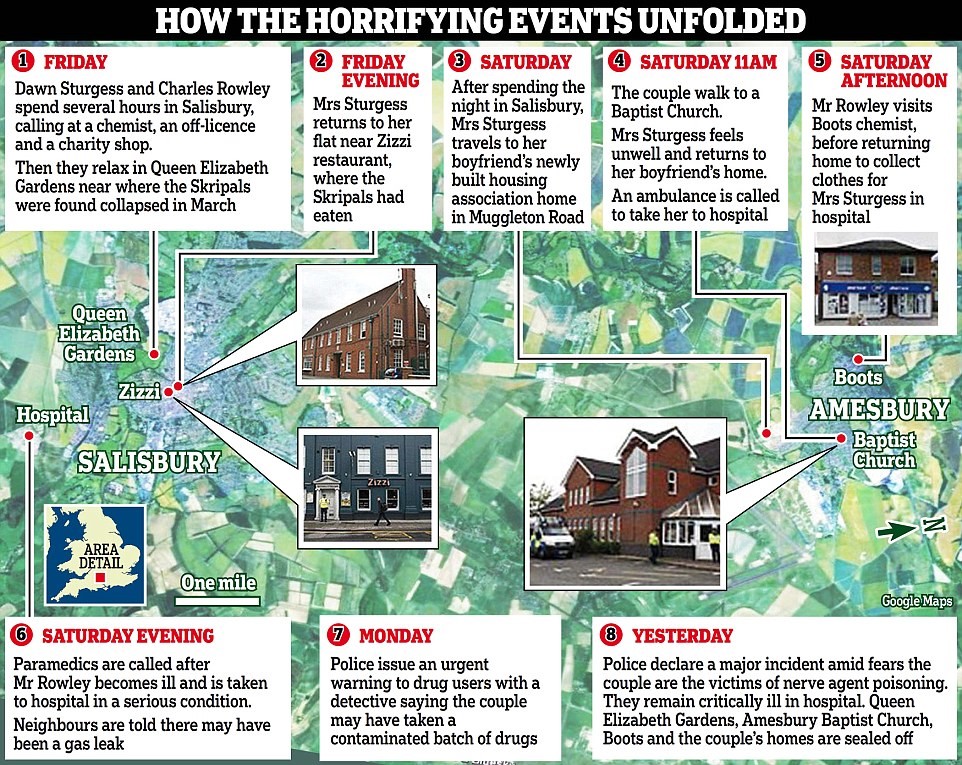
Image from Daily Mail, 7 July 2018
So far, the real winner of the first incident at Salisbury has not been more objective investigation but a pledge of more funding for research laboratories at Porton Down:
UK defence secretary Gavin Williamson will on Thursday pledge an additional £48m for Britain’s defence science and technology laboratory at Porton Down, in the wake of the poisoning of a former Russian spy with a weapons grade nerve agent. The laboratory was instrumental in identifying Russia as the source of the nerve agent used to target Sergei Skripal and his daughter Yulia 10 days ago in Salisbury.
21st Century Wire Online notes the new role for Porton Down in the expansion of the Pentagon’s extensive overseas biological and chemical weapons facilities across Europe and Central Asia (28 March 2018):
The Pentagon has spent at least $70 million on military experiments involving tests with deadly viruses and chemical agents at Porton Down – the UK military laboratory near the city of Salisbury. The secretive biological and chemical research facility is located just 13 km from where on 4th March former Russian spy Sergei Skripal and his daughter Yulia were found slumped on a bench following an alleged Novichok nerve agent poisoning.
Information obtained from the US federal contracts registry reveals that the Pentagon’s Defense Threat Reduction Agency (DTRA) has funded a number of military projects performed at the UK Defence Science and Technology Laboratory (Dstl), or Porton Down, over the last decade. Among them: experimental respiratory infection of non-human primates (marmosets) with Anthrax, Ebola virus, Marburg virus, Venezuelan equine encephalitis virus, Western equine encephalitis virus, and Eastern equine encephalitis virus. The US Defense Threat Reduction Agency (DTRA) has also funded experiments on animals which were exposed to chemical agents such as Sulphur, Mustard and Phosgene gas.
Readers who are fortunate enough to be enjoying the current Golden Summer in Britain should consider a diversion through the leafy back roads and rideways of Wiltshire on road trips to Salisbury and nearby Stonehenge.
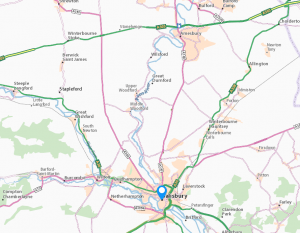
Michelin Road Map for That Dream Holiday in Wiltshire Image: Michelin (Estimated Map Scale 1: 100,000 – 1cm represents 1 km)
Australia’s minor diplomatic expulsions from Canberra in support of the British Government are a reminder of once intimate foreign policy ties with British Empire countries with enthusiastic support of both the mainstream media and wider public opinion during the Cold War era.
As a Year 5 student in 1956, I do recall that our class relished in an impromptu art exercise to bring out the colours of the latest British nuclear test in Australia to liven those black and white press images. I am not sure of the date of our art exercise.
Public opinion tolerated two major nuclear tests that year at Monte Bello Island off Broome and two at Maralinga. There were also minor trials of components of both atomic and hydrogen bombs. Major and minor nuclear weapons tests in Australia and nearby Pacific Islands which are now part of Independent Kiribati.
The British development of atomic and hydrogen bombs was consolidated by an improved delivery capacity offered by missile development in Australia.
Confidence associated with Australian involvement in perfecting weapons of mass destruction had obviously extended to primary school art classes.
All this occurred just two years after the Petrov Spy Scandal in Australia just prior to the 1954 federal election. Vladimir Petrov (1907-91), the obscure third secretary of the Soviet embassy in Canberra and his family were given sanctuary and new identities in Australia.
D notices discouraged media speculation on the whereabouts of the Petrov family, critical reporting of British atomic tests in Australia as well as the activities of the Australian Secret Intelligence Service (ASIS) or the Defence Signals Intelligence. Curious readers should check out the advice on D Notices from the National Archives of Australia (NAA).
All this background material does not resolve the intrigue associated with the Novichok poisonings. Perhaps the stand taken by Theresa May will be justified by the release of archival documents a generation from now. In the short-term, the public should be offered more convincing explanations of the bizarre poisoning events near Salisbury while interest in the topic continues in the mainstream media.
Australians still need to be wary of any return to more intimate security and defence ties with Britain in emergent post-Brexit era at a time when Theresa May’s government is allied hawkish opinion in Washington, Israel and Saudi Arabia. In a sluggish British economy with close to zero growth rate at constant prices in per capita terms, arms exports to the Middle East Region outsell cars and luxury items in demand from political elites.
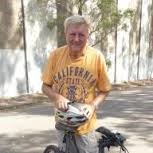 Denis Bright (pictured) is a registered teacher and a member of the Media, Entertainment and Arts Alliance (MEAA). Denis has recent postgraduate qualifications in journalism, public policy and international relations. He is interested in advancing pragmatic public policies that are compatible with contemporary globalisation.
Denis Bright (pictured) is a registered teacher and a member of the Media, Entertainment and Arts Alliance (MEAA). Denis has recent postgraduate qualifications in journalism, public policy and international relations. He is interested in advancing pragmatic public policies that are compatible with contemporary globalisation.









17 comments
Login here Register here-
Christopher J Ward
-
Paul
-
New England Cocky
-
Myra
-
Lalnama
-
De Valera's Neutrality Ghost
-
Chris
-
Tom
-
Paul
-
James Robo
-
Tessa_M
-
Stella
-
Brodie
-
Denis Bright in Brisbane
-
Andrew D'Souza
-
Rubio@Coast
-
Denis Bright in Brisbane
Return to home pageApparently, you are in the vanguard of those who don’t read and won’t take notice of history. If you did you would have known that Vladimir Petrov who defected to Australia was regarded by Western services as one of the most valuable NKVD/MVD/KGB defectors of all time. You seem to have fallen for the despicable claims that Menzies engineered the defection for political gain. Tough pal, some of us know the truth, now look it up for yourself – I’m not providing references for writers, nor am I colluding in the on-going deceptive re-writing of history. I’d write for AIM but I’m retired.
Thanks for the interesting article Denis!
It looks like a very mysterious case. More transparency and disclosure by the government on all levels would certainly assist.
All the best.
Excellent informative article. Thank you.
Interesting insights on contemporary Britain, Denis. The Good, Bad and the Ugly of the Cahedral City of Salisbury and its leafy surrounds.
Interesting article, raising some heated responses, fortunately this is a good opportunity to air all sides of the case. We in the general public will never know what really happened.
Anticipates policy developments in international relations from Britain in the Post-Brexit Era. Are things drifting back to the Old 5 Eyes Era when unity between Canberra, London, Wellington and Washington carried more independent perspectives from Canada? Will Penny Wong takes us out of this new dependency on Britain and President Trump as the world moves into the Space War Era? Will Australia want a share of the stella war action through our existing electronic bases?
This article helps everyone to understand why male members of the royal family are often in military uniforms. Britain is not always a peaceful realm and needs a change of government to Jeremy Corbyn to cool down.
Britain takes on too much. It could achieve more as a neutral country like Ireland and Sweden. The British National Health Service may be in chaos but Porton Down Defence Labs are receiving windfall funding and a top-up from the USA.
What a contrast to that SBS series on the ancient routeways of neolithic Britain compared with the topics this article has raised.
A drive to the North Wessex Downs to see Saturday morning’s solar eclipse from Salisbury might have gone right past the Port Down Defence Facility.
Hardly a heatwave today with a 7-19oC temperature range and an opportunity for Theresa May’s policy makers to shill out.
Thanks for the article Denis. We do live in scary times and taboo topics need to be opened up.
Denis thanks for sharing these fond memories from your year 5 art class.
Why do you think your teacher was interested in everyone’s feedback on the British nuclear test?
Were they wanting to sample opinions in the class?
Denis, thanks for another interesting and well-researched article.
British weapons exports to Saudi Arabia and their use in Yemen is appalling. This article gives a balanced picture of the real Britain with its leafy lanes and hidden secrets. I really want to visit those exotic places in Wiltshire to see them for myself.
Thanks for that interesting question,Stella.
As our US Alliance Colleagues prepare for new stellar space defence projects, it is surprising how little has changed since 1956 when British nuclear weapons were regularly tested in Australia and nearby islands like Kiribati.
Our Year 5 teacher went on to become a household name across Australia as a television celebrity and patron of live theatre as well as cabaret productions.
Bernard King (1934-2002) even at 21-22 years of age became the first lay teacher at the Christian Brothers’ College, Ipswich. He was a complex, highly ethical and talented personality..
I think the art activity was simply designed to involve a large class creatively.
Bernard sought to talk up talent in all his endeavours from class-room activities to sporting events to displays at fetes or school concerts and other productions.
He could be quite caustic in his responses to talent performances in middle age a generation or more after 1956.
I saw him as a more spontaneous and flexible young teacher at a time when discipline in a class of seventy students did not seem to present any problems.
Good to recall a positive character like Bernard King.
Well done Denis. Looks like you have done a lot of research on this. Hats off to you for keeping us informed. Lovely to know those hidden facts.
Labour is polling strongly in Britain and particularly in London and Wales. The election of Jeremy Corbyn might provide some answers to these ongoing Novichok Mysteries. Are we really meant to believe that Novichok nerve agents were really smeared on door knobs and also left in a perfume bottle discarded in Queen Elizabeth Park in Salisbury? Is Russian agents performed the first Novichok job, they would have been more professional to ensure that the members of the Skripol family being targeted did not attain their new identity in the USA as proclaimed by the CIA’s own Voice of America Network.
The Times in London confirms the Skripals’ new identity in the USA.(8 April 2018).
“Sergei and Yulia Skripal will be offered new identities and a new life in America in an attempt to protect them from further murder attempts.
Intelligence officials at MI6 have had discussions with their counterparts in the CIA about resettling the victims of the Salisbury poisoning. “They will be offered new identities,” a senior Whitehall figure said.
Senior sources revealed both victims were conscious and would soon begin helping investigators with their inquiries into the nerve agent attack on March 4. Yulia, 33, a Russian citizen, has rejected demands by the Russian embassy in London that it provides her and her father with consular support — a move that has convinced British officials she might move to the West permanently.”
I would not take this report to literally as Sergei and Julia could be anywhere of their choosing. Why not in Cronulla or Magnetic Island.
Britain offered the Skripals a BMW and a pleasant unit in the Cathedral City of Salisbury.